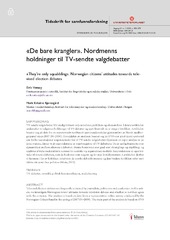«De bare krangler». Nordmenns holdninger til TV-sendte valgdebatter
Peer reviewed, Journal article
Published version

Åpne
Permanent lenke
http://hdl.handle.net/1956/21990Utgivelsesdato
2019-03Metadata
Vis full innførselSamlinger
Originalversjon
https://doi.org/10.18261/issn.1504-291X-2019-03-03Sammendrag
Televised election debates are frequently criticised by journalists, politicians and academics. In this article, we investigate Norwegian voters’ attitudes towards television debates and whether or not they agree with the criticism. The analysis is based on data from a representative online survey conducted by the Norwegian Citizen Panel in the spring of 2017 (N=2039). The main part of the analysis is based on 1700 answers to an open question about which associations the respondents have with televised election debates. Through a topoi analysis of the open answers, we find that the respondents are very negative towards the debates. They are particularly frustrated by the dynamics between the participants in the debate, which they experience as “quarreling” and “bickering” and clear violations of established conversation and argumentation norms. The respondents are also critical towards the tone in the debates, which they find too negative and adversarial. We discuss the findings in light of the criticism that has been directed at the Norwegian debate formats and the broader criticism that has been directed at the “in-your-face politics” of our time (Mutz, 2015). TV-sendte valgdebatter blir stadig kritisert av journalister, politikere og akademikere. I denne artikkelen undersøker vi velgernes holdninger til TV-debatter og spør hvorvidt de er enige i kritikken. Artikkelen baserer seg på data fra en representativ nettbasert spørreundersøkelse gjennomført av Norsk medborgerpanel våren 2017 (N=2039). Hoveddelen av analysen baserer seg på 1700 svar på et åpent spørsmål om hvilke assosiasjoner respondentene har til TV-sendte valgdebatter. Gjennom en topoi-analyse av de åpne svarene, finner vi at respondentene er svært negative til TV-debattene. De er særlig frustrerte over dynamikken mellom aktørene i debatten. Denne beskrives i stor grad som «krangling» og «kjekling» og oppleves å bryte med etablerte normer for samtale- og argumentasjonsskikk. Respondentene er også kritiske til tonen i debatten, som de beskriver som negativ og for mye kritikkorientert. I artikkelen drøfter vi funnene i lys av kritikken rettet mot de norske debattformatene og den bredere kritikken rettet mot tidens «in-your-face politics» (Mutz, 2015).
